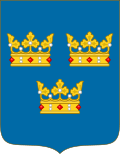Västerås
| Västerås | |
|---|---|
|
Skrapan in Västerås City | |
|
Nickname(s): Mälarstaden(The City of Mälaren), | |
 Västerås 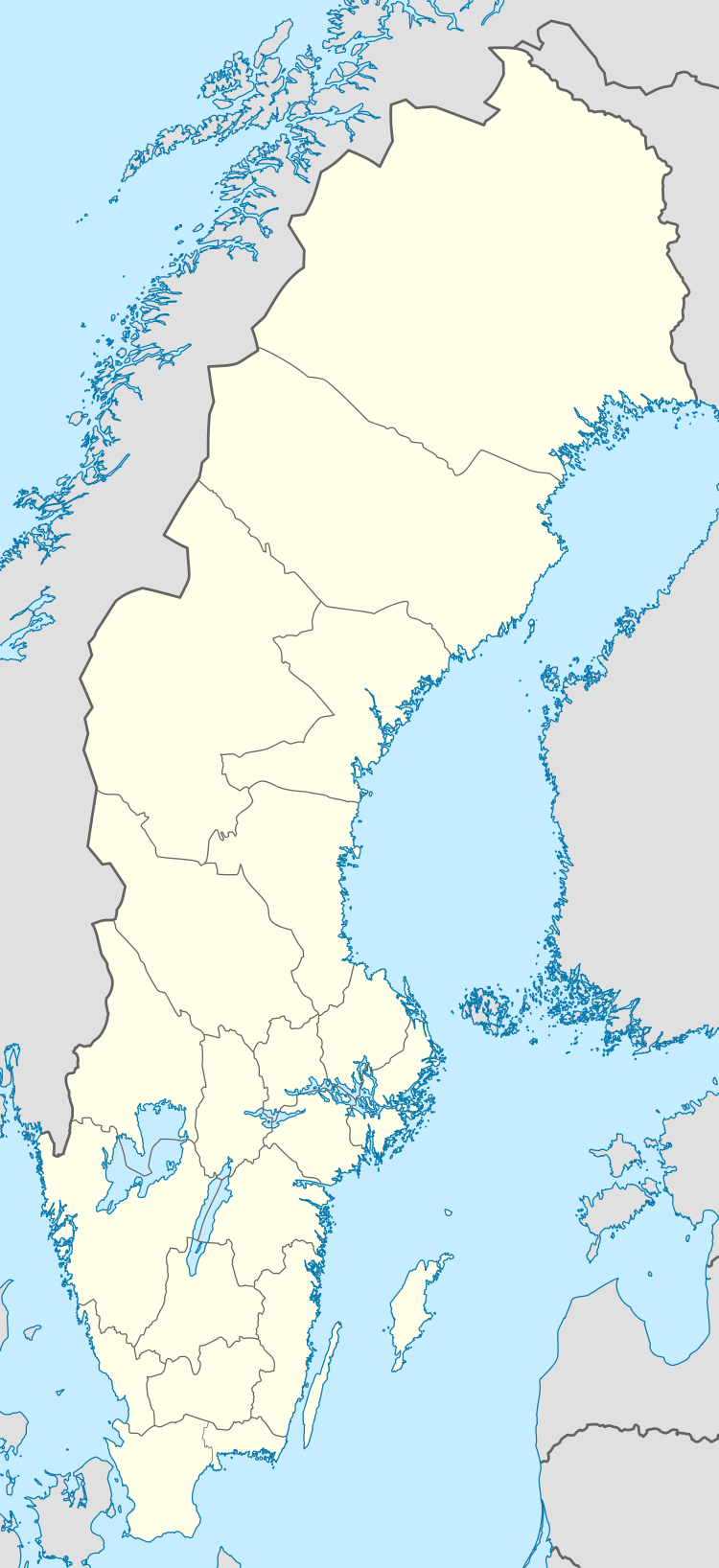 Västerås | |
| Coordinates: 59°36′58″N 16°33′10″E / 59.61611°N 16.55278°ECoordinates: 59°36′58″N 16°33′10″E / 59.61611°N 16.55278°E | |
| Country | Sweden |
| Province | Västmanland |
| County | Västmanland County |
| Municipality | Västerås Municipality |
| Area[1] | |
| • City | 52.94 km2 (20.44 sq mi) |
| • Metro | 962.78 km2 (371.73 sq mi) |
| Elevation | 17 m (56 ft) |
| Population (31 December 2010 (Metro, 31 December 2013))[1][2] | |
| • City | 110,877 |
| • Density | 2,094/km2 (5,420/sq mi) |
| • Metro | 145,218 (Västerås Municipality) |
| Time zone | CET (UTC+1) |
| • Summer (DST) | CEST (UTC+2) |
| Postal code | 721 00 - 728 20 |
| Area code(s) | (+46) 21 |
| Website |
www |
Västerås [vɛstɛrˈoːs] is a city in central Sweden, located on the shore of Lake Mälaren in the province Västmanland, some 100 kilometres (62 miles) west of Stockholm. The city had a population of 110,877 inhabitants in 2010,[1] out of the municipal total of 145,218 (2015).[3]
Västerås is the seat of Västerås Municipality, the capital of Västmanland County and an episcopal see.
History
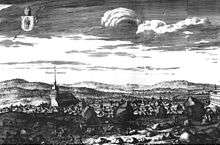

Västerås is one of the oldest cities in Sweden and Northern Europe. The name originates from Västra Aros (West Aros), which refers to the river mouth of Svartån. The area has been populated since the Nordic Viking Age, before 1000 AD. In the beginning of the 11th century it was the second largest city in Sweden, and by the 12th century had become the seat of the bishop.
Anundshög is located just outside the City of Västerås. Anundshög is Sweden's largest burial mound. "Hög" is derived from the Old Norse word haugr meaning mound or barrow. It was built about 500 AD and is over 74 yards (68 m) wide and is almost 10 yd (9.1 m) high.
In the ensuing centuries, a cathedral and a monastery were built. The first City Arms date from the end of the 13th century.
King Gustav I of Sweden called together the riksdag in Västerås. During the riksdag assembly, the decision was made to convert Sweden into a Protestant state and to remove the power of the Catholic Church.
Rudbeckianska gymnasiet, the oldest gymnasium (secondary school) in Sweden, was built in Västerås by Johannes Rudbeckius in 1623.
In the 18th and 19th centuries, the growing of cucumber became popular, and Västerås received the nickname Gurkstaden (the Cucumber City), which it still retains today.
Today
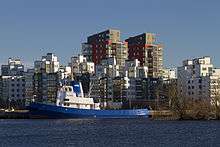
Västerås is predominantly known as an industrial city, but also a retailing and logistics city. The city wants to distinguish itself as Västerås - Mälarstaden, meaning "Västerås—the city by Lake Mälaren", in order to attract tourists and new inhabitants, as well as students to the local university college, Mälardalen University (approximately 16,000 enrolled students in Västerås and in the nearby Eskilstuna). To this effect, the city has started using a designed logo as branding in some official contexts, partially replacing the coat of arms, as well as rebuilding several old harbor areas to make them more attractive to live in. Västerås has the largest lakeside commercial and recreational port in Scandinavia on Lake Mälaren.
The city also has a skyscraper cordially nicknamed "Skrapan" (English: The Scraper) which has Sweden's highest-located cocktail bar, called Sky Bar, on the 24th floor of the building. Västerås hosts Power Big Meet, an annual event where owners of high-powered American cars can meet.
Climate
According to the Köppen climate classification, Västerås experiences a humid continental climate with cold winters and warm summers.
Summers tend to be quite unpredictable with sunny spells but with a risk of sudden showers. The sunniest weather usually occurs when high-pressure systems are blocking the low-pressure systems that usually move in from the Atlantic Ocean. Daytime temperatures in July mostly hover around 22 °C (72 °F), but may sometimes exceed 25 °C (77 °F) and occasionally even 30 °C (86 °F).
Winters are usually cold with a snow cover that lasts for several months. Some winters can be mild with longer spells without snow on the ground. The weather differs a lot whether the air masses are coming from the Atlantic Ocean or from the Eurasian continent. In the first case, temperatures over 5 °C (41 °F) might be expected. In the second case, the temperature may not rise above −15 °C (5 °F) in the middle of the day. Lake Mälaren is usually frozen from December until the end of March.
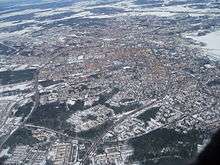
The highest official temperature reading of 36.0 °C (96.8 °F) was recorded on July 9, 1966. The lowest temperature of −36.5 °C (−33.7 °F) was recorded on January 24, 1875.[4]
| Climate data for Västerås (1961–1990) | |||||||||||||
|---|---|---|---|---|---|---|---|---|---|---|---|---|---|
| Month | Jan | Feb | Mar | Apr | May | Jun | Jul | Aug | Sep | Oct | Nov | Dec | Year |
| Daily mean °C (°F) | −3.8 (25.2) |
−3.8 (25.2) |
−0.2 (31.6) |
4.7 (40.5) |
11.1 (52) |
15.9 (60.6) |
17.1 (62.8) |
15.8 (60.4) |
11.4 (52.5) |
7.0 (44.6) |
1.5 (34.7) |
−2.2 (28) |
6.21 (43.17) |
| Average precipitation mm (inches) | 40.0 (1.575) |
29.2 (1.15) |
32.3 (1.272) |
34.9 (1.374) |
39.6 (1.559) |
54.4 (2.142) |
75.3 (2.965) |
71.5 (2.815) |
67.4 (2.654) |
56.5 (2.224) |
56.5 (2.224) |
44.7 (1.76) |
602.3 (23.714) |
Economy
Industry

In 1891, the Turbine House, a small hydroelectric dam was built on Svartån, in central Västerås. This early electrification encouraged ASEA, a large electricity equipment manufacturer, to concentrate its operations in Västerås, shifting focus away from Arboga. After the 1988 merger with the power systems company Brown, Boveri & Cie, ASEA became ABB. As a result, Västerås is home to its ABB AB Swedish subsidiary headquarters.

Since the Westinghouse takeover of ABB's nuclear business it is owned by Westinghouse Electric Company. It is situated mainly at the Mimer Complex in the city centre. Production facilities are in Finnslätten and Saltängen. Westinghouse Sweden produces nuclear fuel and offers nuclear services for the Boiling Water Reactor. As of 2014, Westinghouse Sweden had more than 1000 employees.[5] The plant has provided fuel for Ukraine since 2005. On 11 April 2014, after the Russian annexation of Crimea, the contract with Energoatom for the South Ukraine Nuclear Power Plant was extended through 2020.[6]
Other major industries include transportation like Bombardier with several distribution centres, coppersmiths Outokumpu Copper and IT.
Retailing and trade
One of the historical reasons that made Västerås a city is its trading-friendly location by the river Svartån and lake Mälaren. The city remains one of the main logistical centers in Sweden due to its central location in the densely populated region Mälardalen and favourable infrastructure connections with railways, waterways and highways. Amongst others, ICA AB has one of its main distribution centres located in Västerås.
Västerås is the birthplace of multinational clothing retailer H&M. Their first store was opened in the town centre in 1947.[7]
Erikslund Shopping Center, on the outskirts of Västerås, is Sweden's biggest mall until Mall of Scandinavia is scheduled to open in 2015, and the retail park is the third biggest in sales after Kungens Kurva and Barkarby.[8][9]
Sports
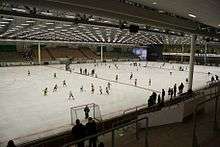
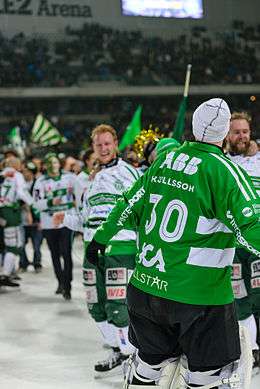
- De grönvita (The Green and White), Västerås SK - Founded on January 29, 1904, "The Green and White" is the most successful bandy team in Sweden, with 20 Swedish Championships won. They have the largest permanent indoor arena for bandy in Sweden, ABB Arena Syd. The Bandy World Championship have been played in Västerås several times.
- VIK Västerås HK, known as VIK Västerås Hockey Klubb. The club had its greatest moment in 1992/1993 when the club won the regular series in the Swedish Elitleague (VIK reached quarter finals in the playoff). In 2000 the club was degraded from the league and faced a financial crisis. The club was declared bankrupt. During the fall of 2000 the club restarted in the lowest division which the team won. Today (2016) they are playing in Hockeyallsvenskan. Among hockey players from Västerås you find: Nicklas Lidström, Tommy Salo, Patrik Berglund, Mikael Backlund and many more.
- Västerås SK, currently plays in the third tier of Swedish football, Division 1 Norra. Having mostly been playing in the higher divisions of Swedish football. The last time the club was in the premier division was in 1997.
- IFK Västerås FK, football club in Division 5 Västmanland
- IK Franke, football club in Division 2 Norra Svealand
- Juventus IF, football club in Division 3
- Skiljebo SK, football club in Division 2 Norra Svealand
- Västerås IK, football club in Division 2 Norra Svealand
- Syrianska IF Kerburan, football club in Division 2 Norra Svealand
Notable natives
- Axenstar, power metal band
- Bobo Stenson, jazz pianist
- Dagmar Lange, author under the pen name Maria Lang
- Embee, hip hop deejay and producer
- Esbjörn Svensson, jazz pianist
- Fredrik Johansson, musician
- Frida Hansdotter, alpine skier
- Fronda, rapper
- Gary Sundgren, football player
- Jonny Rödlund, football player
- Lars Wallin, fashion designer
- Lars Ekborg, comedian
- Linda Rosing, singer, politician, model
- Loreen, singer, winner of Eurovision Song Contest 2012 in Baku, Azerbaijan
- Magnus Lindgren, jazz musician
- Mai Zetterling, actress and film director
- Maria Bonnevie, actress
- Maria Montazami, television personality
- Markus Oscarsson, Olympic gold medalists in canoeing 2004
- Mattias Andréasson, Singer and member in E.M.D
- Mikael Backlund, ice hockey player
- Niklas Lidström, ice hockey player
- Pandora, singer
- Patrik Berglund, ice hockey player
- Patrik Isaksson, swimmer
- Pontus Kåmark, football player
- Promoe, rapper (member of Looptroop)
- Pugh Rogefeldt, musician
- Sadako Yamamura, undead qt
- Stefan Pettersson, footballer
- Tomas Tranströmer, poet
- Kydez, music producer
- Tommy Salo, ice hockey player
- Victor Lindelöf, footballer
- Åsa Svensson, tennis player
Travel
See also
References
- 1 2 3 "Localities 2010, area, population and density in localities 2005 and 2010 and change in area and population". Statistics Sweden. 29 May 2012. Archived from the original on 17 December 2012.
- ↑ "Population in the country, counties and municipalities by sex and age 31/12/2013". Statistics Sweden. 31 December 2013. Archived from the original on 22 November 2014.
- ↑ http://www.statistikdatabasen.scb.se/pxweb/sv/ssd/START__BE__BE0101__BE0101A/FolkmangdTatort/table/tableViewLayout1/?rxid=65599dff-176c-4ced-a249-2eeeb177f73c
- ↑ "Västmanlands klimat". SMHI. Retrieved June 28, 2013.
- ↑ "Westinghouse Electric Sweden". Company website. Westinghouse. Retrieved 15 April 2014.
- ↑ "More Westinghouse fuel for Ukraine". website. World Nuclear News. 11 April 2014. Retrieved 16 April 2014.
- ↑ "H&M: Our-History".
- ↑ "Ikano och Ikea: 136 000 kvm handel vid Globen" (in Swedish). Fastighetsvärlden. 2013-01-23. Retrieved 16 January 2015.
- ↑ "Erikslund behåller sin tredje plats" (in Swedish). Vestmanlands Läns Tidning. 2014-12-07. Retrieved 16 January 2015.
External links
| Wikimedia Commons has media related to Västerås. |
| Wikivoyage has a travel guide for Västerås. |
- Västerås official website
- Local portal for Västerås, articles, pictures etc
- Westeraas, Ancient See of - Article in the Catholic Encyclopedia
- Pictures from Anundshög, Västerås, Sweden; www.remains.se

